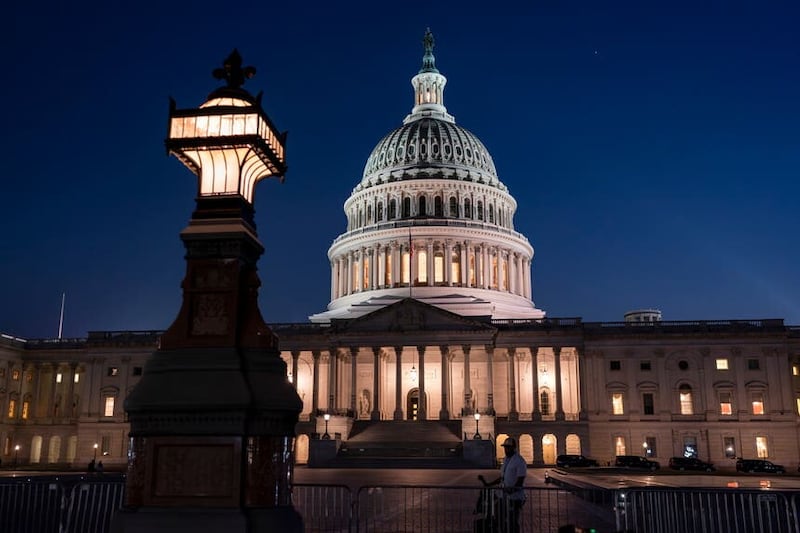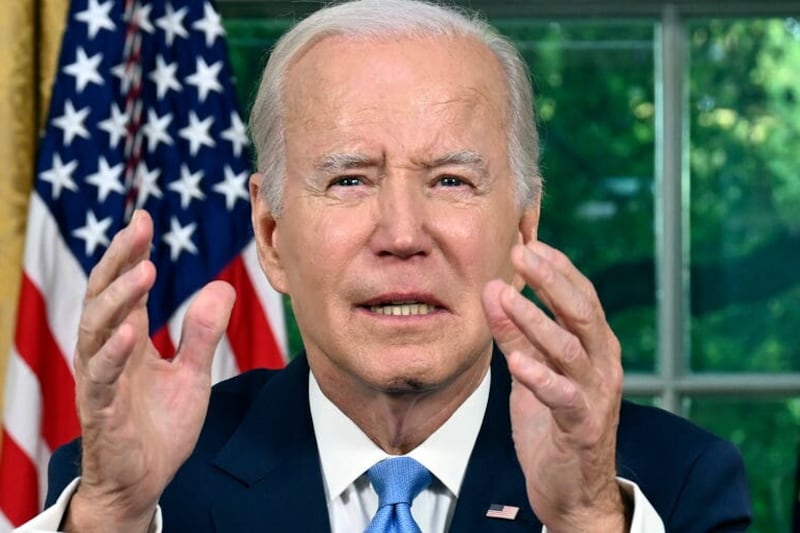Four Republican presidential candidates were given several opportunities during a debate to criticise the absent Donald Trump but mostly targeted each other, with Nikki Haley taking the brunt of the attacks as she gets more interest from donors and voters.
With just over a month before the 2024 primary calendar begins, the debate in Alabama demonstrated how firm Mr Trump’s grip remains on the party.
But the focus on former United Nations ambassador Ms Haley reflected how other candidates perceive her as a threat to their chances of taking on Mr Trump directly.
Aside from former New Jersey governor Chris Christie, most of the candidates have spent more time in debates going after each other than taking aim at Mr Trump, reflecting the former president’s popularity among Republicans and what many see as diminishing returns in attacking him.

The last scheduled debate before Iowa’s Republican caucuses on January 15 may have limited impact on the race, airing on a lesser-known television network, NewsNation, from a state which Republican presidential candidates have carried since 1980.
Mr Trump remains dominant in national and early-state polls.
And after holding counterprogramming rallies during the first three debates, he did not bother this time and instead went to a closed-door fundraiser.
His campaign posted an ad during the debate focusing on President Joe Biden as both parties head towards a potential rematch of the 2020 election Mr Trump lost.
Mr Christie repeatedly tore into Mr Trump on Wednesday and challenged Florida governor Ron DeSantis to answer directly if he believed Mr Trump was fit or unfit to be president again.
The crowd at the University of Alabama booed him at one point as he attacked Mr Trump.
“His conduct is unacceptable. He’s unfit. And be careful of what you’re going to get,” warned Mr Christie, who has been alone among leading Republicans in his focus on the race’s clear front-runner.
“There is no bigger issue in this race than Donald Trump,” he said earlier.

Mr DeSantis suggested Mr Trump, who is 77, is too old for the job.
“Over a four-year period, it is not a job for someone that’s pushing 80,” Mr DeSantis said.
“We need someone who’s younger.”
Biotech entrepreneur Vivek Ramaswamy again raised his hand as a candidate who would support Mr Trump even if he were convicted in any of the four felony indictments he faces.
Mr Ramaswamy accused his other opponents of bowing to Mr Trump for years to secure political posts or financial gain, but the closest the 38-year-old ever came to criticising Mr Trump was to call for a new generation of leadership.
Ms Haley stood silently during the extended discussion, and neither the moderators nor her rivals asked for her opinion.
The debate’s brief focus on Mr Trump was a reprieve for Ms Haley, who spent most of the debate on the defensive.
Mr DeSantis accused Ms Haley of backing down from media criticism and Mr Ramaswamy suggested she was too close to corporate interests as she gets new attention from donors.

He touted his own willingness to pick high-profile fights with his critics and went after Ms Haley just moments into the debate, reflecting the rivalry between the two candidates reflected in duelling early-state television ads.
They also tussled over China, long an animating issue for conservatives worried about Beijing’s influence.
Later in the debate, Ms Haley credited Mr Trump for taking a hard line with Beijing on trade but said he was too passive on other fronts, including allowing China to capture American technology for its own military use and purchase American farmland.
Interrupting Ms Haley, Mr DeSantis accused her of allowing Chinese investment in South Carolina when she was governor and suggested her corporate donors would never allow her to be tough on Beijing.
“First of all, he’s mad because those Wall Street donors used to support him and now they support me,” Ms Haley retorted before accusing Mr DeSantis of being soft on Chinese investment in Florida.
Mr Ramaswamy, always the most eager to deliver personal barbs on the debate stage, turned a foreign policy discussion into another attack on Ms Haley, seemingly trolling her to name provinces in Ukraine and suggesting she does not understand the country.
As he kept piling on, Mr Christie stepped in to declare Ms Haley “a smart, accomplished woman” and dismiss Mr Ramaswamy as “the most obnoxious blowhard in America”.
With Mr Trump absent, the atmosphere around the debate lacked some of the buzz sometimes associated with such affairs, especially in ostensibly open primaries.

Less than two hours before the opening salvo, the media room, which is normally the practice hall for the University of Alabama’s Million Dollar Band, was barely half full.
The television and radio platforms around the periphery – the spin room, in debate parlance – were noticeably quiet, lacking the high-profile surrogates or campaign staff who might normally be appearing live on cable news or talk radio to pitch on their candidates’ behalf.
Outside Moody Music Hall on campus, more buzz came from state high school football championship games being played in Bryant-Denny Stadium.
The debate may have been hard to find for many prospective viewers.
It aired on NewsNation, a cable network still trying to build its audience after taking over WGN America three years ago.
NewsNation’s Elizabeth Vargas moderated alongside Megyn Kelly, a former Fox News anchor who now hosts a popular podcast, and Eliana Johnson of the conservative news site Washington Free Beacon.
The field of invited candidates has shrunk in half since eight were on the stage at the first debate in Milwaukee in August, as the Republican National Committee tightened the criteria to reach the stage each time.
For Tuesday, candidates had to get at least 6% in multiple polls and amass 80,000 unique donors.
Former vice president Mike Pence, South Carolina Senator Tim Scott and North Dakota governor Doug Burgum have all dropped out of the race after participating in at least one debate.
Former Arkansas governor Asa Hutchinson is continuing his campaign but failed to qualify.
The debate setting in Alabama was another reminder of Mr Trump’s strong position – and how he outpaced an even larger Republican field when he first ran and won in 2016.
Mr Trump swept Southern primaries from Virginia to Arkansas and Louisiana in his first campaign.
He further demonstrated his hold this week with an endorsement from Alabama Senator Katie Britt, who ascended in Republican politics from the party’s establishment wing but chose the debate in her home state as the right time to align herself with the former president.





